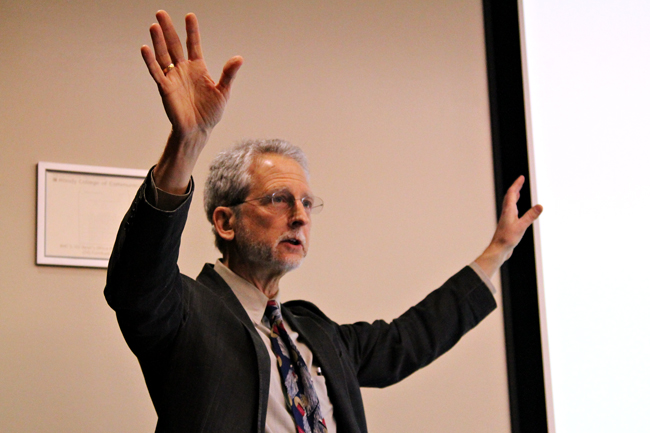War stories and songs from ancient times to present day are useful for understanding what happens to people living under dire circumstances, according to classics professor Tom Palaima, who gave a talk at the Belo Center for New Media on Tuesday.
Palaima’s lecture, part of the Moody College of Communications’ Senior Fellows Honors Program, focused on the mental and physical state of soldiers returning from war. He shared stories and songs of soldiers’ homecomings that have common motifs like trauma and neglect.
The public’s general nonchalance towards traumatic war stories, although they form a major, recurring part of the cultural narrative, is concerning, according to Palaima.
“I worry about all this,” Palaima said. “I worry that this literature and these songs are so beautiful, that we experience them and emote and think that’s enough. I don’t know how to make people get up and want to do something.”
Tuesday’s lecture started a dialogue about music’s societal importance and the role of music as a catalyst for action, according to Dave Junker, director of the program.
“We don’t talk about music enough,” Junker said. “It’s a part of our lives in an emotional landscape, and this [lecture] gives us the chance to do it.”
Communication studies junior Ed Hunt, who attended the lecture, said the element of the lecture that interested him the most was when Palaima played “Jimmy’s Road,” by Willie Nelson. The song is about a young man being drafted into the military.
“Tom Palaima started crying even though he’s studied it,” Hunt said. “Stories have the power to make you feel emotions over and over again.”
Palaima’s concern about societal apathy is valid, communications studies senior Kaileen Paige said.
“We have so many things we think about on a daily basis,” Paige said. “I don’t think war is as present in our lives like in the media for World War I and World War II.” The current generation is less exposed to stories about war because of media censorship, Palaima said
“This generation has it much tougher than my generation,” Palaima said. “We could go out on the streets and protest — we saw the war graphically on television, and it was the last mistake the government made.”
Because people can personalize the news they consume, topics such as war never make it on some people’s feeds, Palaima said.
“People are so consumed with everything else that’s happening [in their lives],” Paige said. “Call to action doesn’t work as well nowadays.”


















